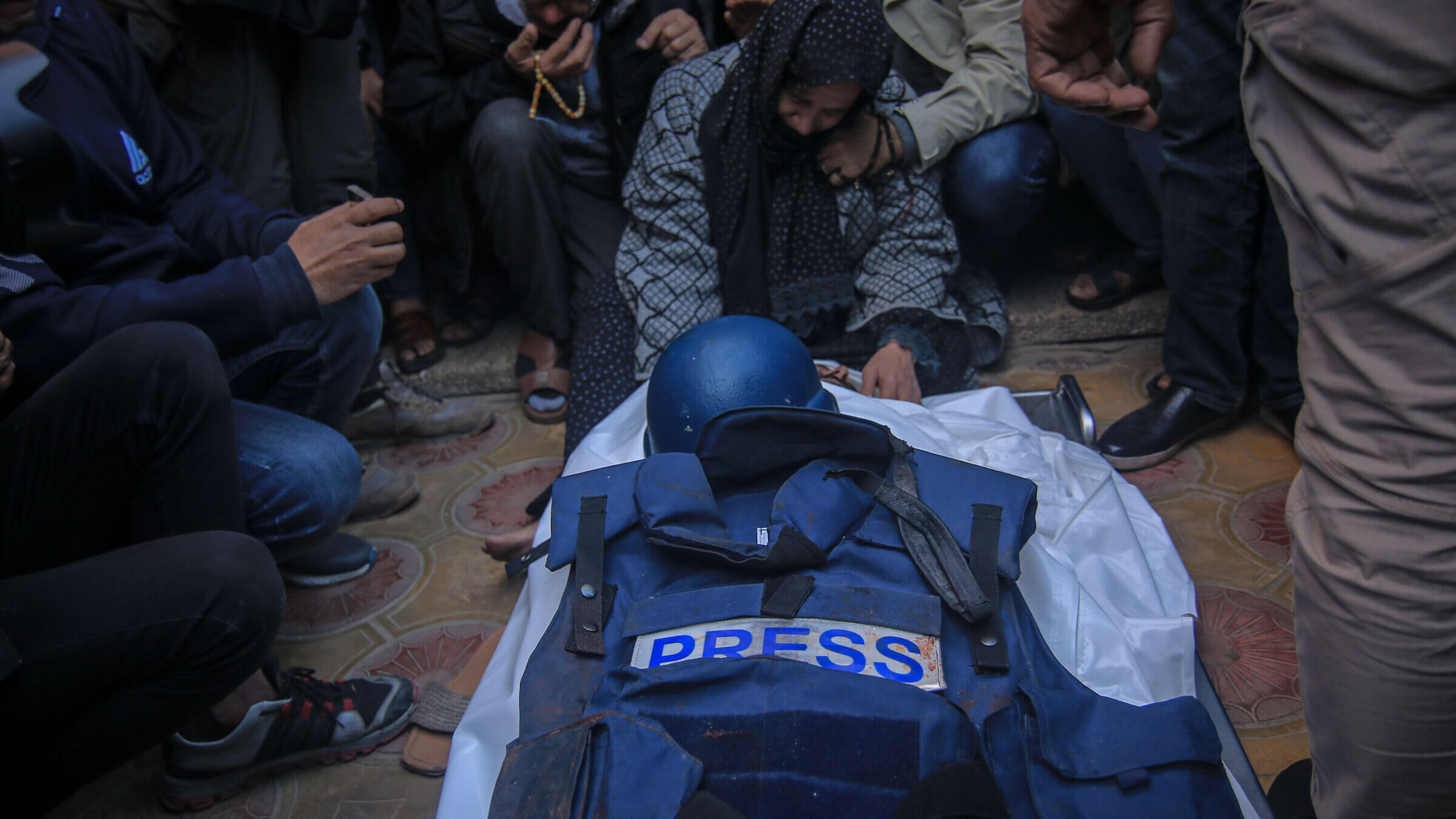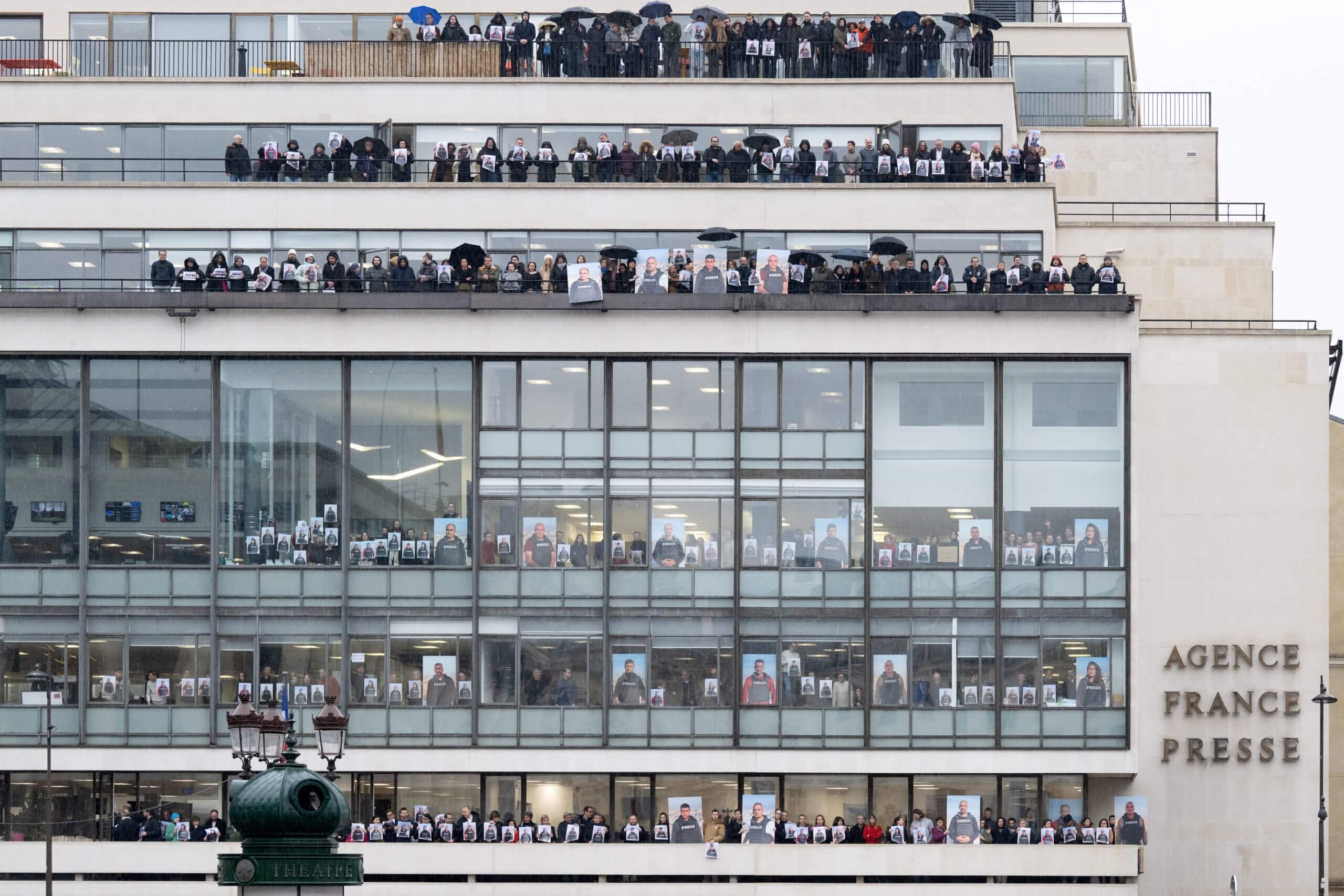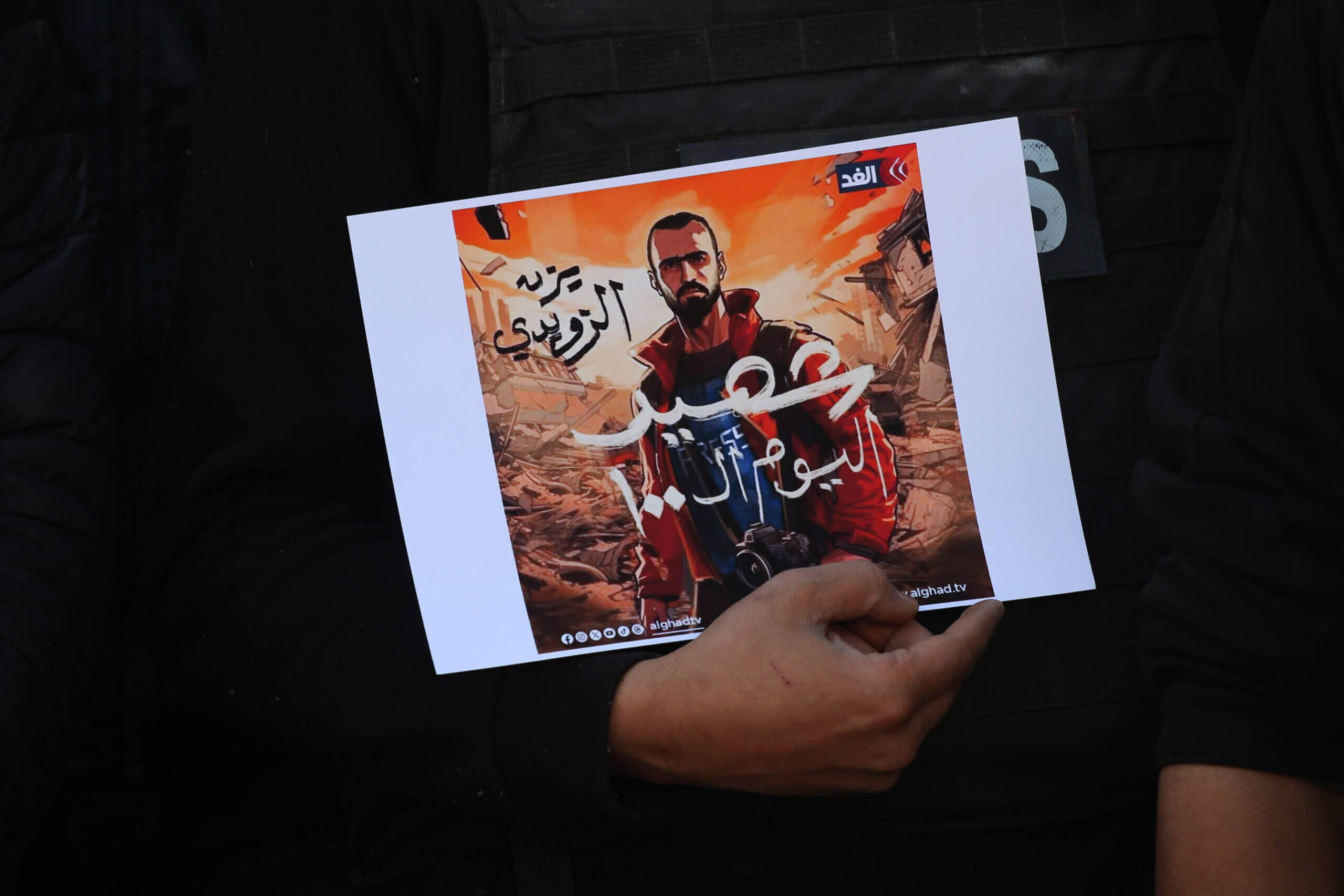‘Draconian methods’: Israel knocked for jailing, killing journalists
The Committee to Protect Journalists ranked Israel as the sixth-worst offender in the world for detaining journalists

Mourners at the funeral of Al Jazeera cameraman Samer Abu Daqqa in the center of Khan Younis, Gaza, on Dec. 16. The Committee to Protect Journalists said that Israel was among the worst offenders for detaining journalists in 2023, in addition to killing dozens of reporters and media workers in Gaza during the ongoing war. Photo by Getty Images
When images circulated of Israeli soldiers rounding up Palestinian men in their underwear in a northern Gaza neighborhood last month, several international journalists identified one of their colleagues among the group.
Diaa Al-Kahlout, bureau chief for Al-Araby Al-Jadeed, an Arabic-language publication based in London, was ultimately detained for a month without charges before his release.
Al-Kahlout, who said he was beaten and forced to eat expired food during his detention, was one of a record number of Palestinian journalists arrested by Israel last year, according to the Committee to Protect Journalists. The country was holding 17 journalists in jail when the watchdog group conducted its annual count, completed in December and released Thursday, ranking it alongside Iran and Eritrea as among the worst offenders when it comes to imprisoning journalists.
“Israel’s standing in CPJ’s 2023 prison census is evidence that a fundamental democratic norm — press freedom — is fraying as Israel exploits draconian methods to silence Palestinian journalists,” Jodie Ginsberg, CPJ’s chief executive, said in a statement. “This practice must stop.”
This year’s ranking of the 10 worst offenders marks the first time that Israel has been included. China and Myanmar topped the list, detaining 44 and 43 journalists respectively. CPJ describes the report as a snapshot, and likens it to a census,” in that it includes journalists in government custody on Dec. 1., but not those released before or imprisoned after that date. Overall, the number of jailed journalists last year — 320 — was the second-highest recorded by CPJ since it began the census in 1992.
The Israeli military, which administers the West Bank, said in a statement Monday that it “takes all operationally feasible measures to mitigate harm to civilians including journalists.” A government spokesperson said at the time of Al-Kahlout’s arrest that he was among a group of “military-age men who were discovered in areas that civilians were supposed to have evacuated.”
A spokesperson for the military said that “when an individual is arrested due to incitement or participation in terrorist activity, it is done without connection to their profession.”
A shutdown
CPJ said that most of the journalists being held by Israel are from the West Bank, where the Israeli army is able to indefinitely detain Palestinians without charges. They include staff at J-Media, a news agency that Israel closed in October after declaring it to be “an arm of the Hamas movement.”
“As you know, the occupation, in time of its war on Gaza, now wants the journalistic and media voice to be absent,” Alaa al-Rimawi, the agency’s director, said in a video posted to social media before his arrest. “I apologize, I apologize because I may not be with you in this coverage and convey your pain, wounds, and victory, with God’s help.”

Sherif Mansour, the Middle East program coordinator for CPJ, said that Israel has also used emergency regulations to shut down some foreign media outlets operating in the country. An online dashboard created by the Emergency Coalition in Arab Society, a civil society group, has counted at least 29 attacks on journalists since Oct. 7, including physical assaults and the damaging or confiscation of their equipment.
Journalists killed
CPJ has also counted 83 journalists and media workers killed during the current round of fighting in the region, which began with the Hamas massacre of 1,200 Israelis on Oct. 7, including 76 Palestinians, some of whom were affiliated with Hamas, and three Lebanese journalists.
“We see an unparalleled number of journalists being killed in Gaza,” Mansour said in an interview. While the Israeli government has said that it does not target journalists, it told both Reuters and Agence France Presse in October that it could not guarantee the safety of their journalists working in Gaza. Israel has not allowed international journalists into Gaza, except for limited tours provided by the military.
More than 24,000 Palestinians have been killed by Israel since the fighting began, according to health officials in the enclave, which is controlled by Hamas.

In addition to the journalists among the civilian casualties that Israel has acknowledged are an inevitable consequence of its war against Hamas, Mansour said it appears that Israel has intentionally targeted reporters in several cases.
Reuters said Israeli tank fire killed one of its journalists, Issam Abdallah, who was working in Lebanon near the border with Israel in October. An investigation by the news agency found that the group of reporters fired on twice by Israel were clearly identified as press and were not near any combatants. “We don’t target journalists,” Richard Hecht, an Israeli army spokesperson, told Reuters at the time.
Mansour said that several journalists in Gaza were killed, or their families were killed, in Israeli airstrikes after receiving threatening phone calls from officials in Israel. In some cases these appeared to be precision strikes by drones, including one against Bilal Jadallah, who ran the Gaza Press House and has been dubbed the “father figure” of journalism in the region. He was killed when an Israeli tank shell hit his car.
“There are at least a dozen cases we reported on where we saw journalists being killed in direct attacks,” Mansour said.
Hamas-affiliated journalists
Israeli officials and some pro-Israel advocacy groups have suggested that some journalists collaborated with Hamas during the Oct. 7 attack and are therefore legitimate military targets. Mansour said his organization only includes individuals who are engaged in news gathering in its count of killed and detained journalists, and does not track political spokespeople or militants.
According to CPJ, 27 of the Palestinian journalists killed in Gaza worked for media outlets affiliated with Hamas, the movement that has controlled the region since 2007.
A spokesperson for the Israeli military said that one of the journalists listed by CPJ among the casualties in Gaza, Hamza Al-Dahdouh, was “an Islamic Jihad terrorist” involved in firing rockets at Israel. The army released documents earlier this month that it claimed showed that Al-Dahdouh was a militant, claims that were angrily rebuffed by press freedom groups and his family.
Mansour said that in addition to killing a number of Israeli journalists in their homes on Oct. 7 (who did not seem to be targeted because of their profession), Hamas had restricted freedom of the press in Gaza before the current war. This included shutting down media outlets associated with Fatah, the rival Palestinian faction, and countries that it considered hostile, like Saudi Arabia, as well as monitoring the activity of international journalists working in Gaza.





















